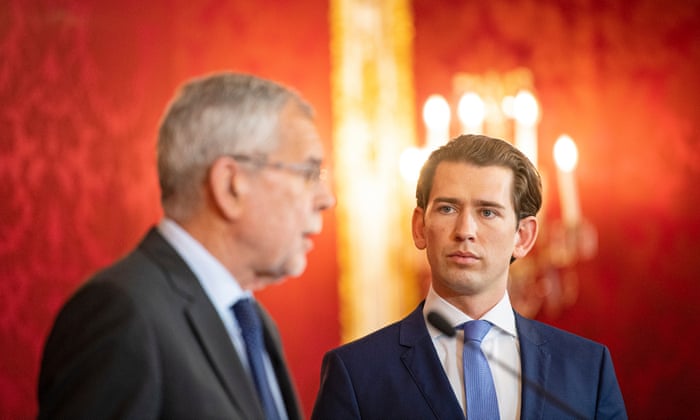
Government officials from standard gatherings crosswise over Europe have approached voters to disregard the extreme right in the current week's European races after Austria's bad habit chancellor surrendered over a video sting that demonstrated him offering open contracts in return for money related and battle backing.
Heinz-Christian Strache ventured down on Saturday after the recording developed. Hours after the fact, Austria's chancellor, Sebastian Kurz, declared snap decisions, finishing the 18-month administering alliance between his inside right Austrian People's gathering (ÖVP) and Strache's far-right Freedom party.
The video demonstrated the bad habit chancellor proposing to exchange government contracts for gathering gifts and good media inclusion with a lady acting like the well off niece of a Russian vitality tycoon. He recognized the video was "disastrous" yet denied doing anything unlawful.
Moderate pioneers over the landmass clarified they trusted the repercussions of Strache's defeat would make themselves felt past Austria in the European parliament decisions, from 23-26 May, in which populist, patriot and far-right gatherings are conjecture to make gains.
The Freedom party is a key individual from a partnership of European patriot parties driven by Matteo Salvini of Italy's League party, who held a debut mass rally in Milan on Saturday with the National Rally gathering of France's Marine Le Pen and Germany's Alternative für Deutschland.
"A couple of months prior, Marine Le Pen was singing the gestures of recognition of Heinz-Christian Strache, saying how imposing he was," France's economy serve, Bruno Le Maire, said. "He has been compelled to leave. We discover why: he was found attempting to pitch his administrations to outside powers. Behind this patriot development is an accommodation to remote powers."
The German chancellor, Angela Merkel, pointedly reprimanded "government officials available to be purchased", saying the EU was confronting "populist developments that in numerous regions are scornful of European qualities, who need to devastate the Europe of our qualities. We need to face this definitively."
The outrage seemed to check the finish of Kurz's generally reprimanded analysis at managing an effective far-right gathering by carrying it into the overlap and building a collusion, instead of attempting to exclude it at the danger of distancing its voters.
"It's for some time been realized that conservative populists destabilize our vote based system," Germany's Socialist equity serve, Katarina Barley, tweeted. "Sebastian Kurz and the ÖVP brought them into government … The Strache case is a notice to all traditionalists: don't work with far-right populists."
It could likewise demonstrate a difficulty for Europe's resurgent far right. Strache's conspicuous energy to grasp debasement remains as a glaring difference to the "channel the marsh" talk populists routinely convey in their endeavors to depict legislative issues as a fight between not too bad normal individuals and a dishonest world class.
The Austrian bad habit chancellor's apparent failings could make it increasingly hard for far-right pioneers, for example, Salvini and Le Pen to introduce their gatherings as good, just marginally all the more conservative options in contrast to the built up focus right.
At first, the extreme right populists tried to make light of the episode. The AfD pioneer, Jörg Meuthen, expelled it as an "interior issue", while the representative for the German party's parliamentary gathering, Christian Lueth, portrayed it in a now-erased tweet as a "pseudo-outrage".
In any case, while neither Salvini nor Le Pen tended to the Austrian outrage straightforwardly, it has at any rate given their adversaries some truly necessary ammo days before the races.
Strache's conduct, said Michael Schickhofer of Austria's Social Democrats, "is emblematic … We can make sure this is only a hint of something larger." István Ujhelyi, a Hungarian Socialist MEP, said Strache was "the main domino" to fall: "Next up are Salvini, Le Pen, Orbán and the remainder of Moscow's far-right manikins."
A German TV pundit, Christian Nitsche, said the outrage could demonstrate that populists were not strong. On the off chance that Austria dismissed the extreme right it would "presumably not yet be a defining moment on Europe's wrong way – yet an indication of expectation that a first nation has the solidarity to get some distance from against majority rule government officials and gatherings", he said.
0 comments:
Post a Comment